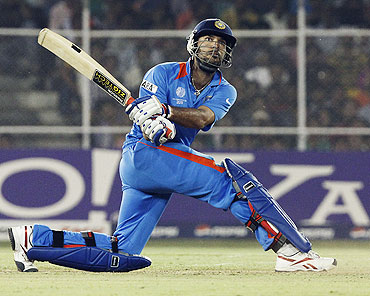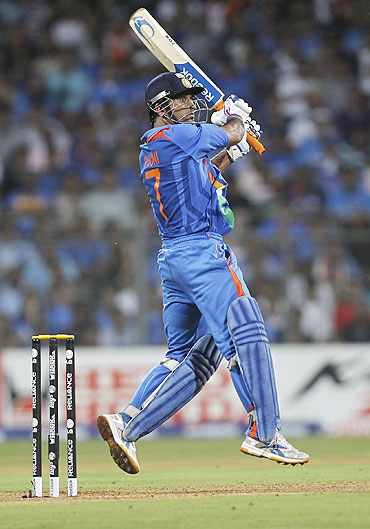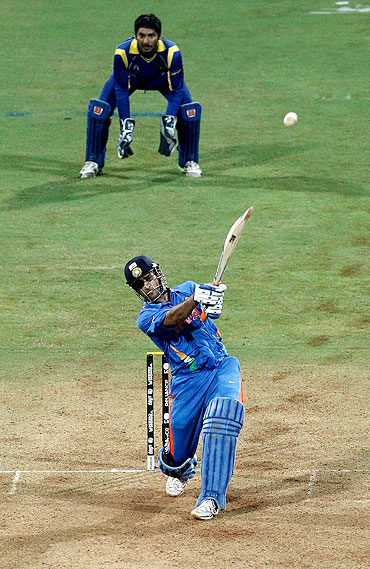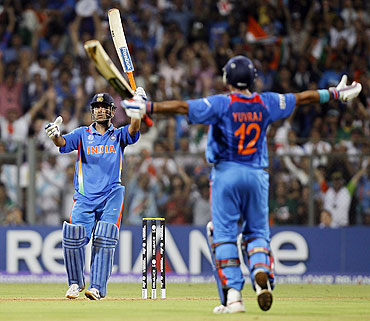 | « Back to article | Print this article |
How we learned to stop worrying and love the six!
'Perhaps it was the fact that we, who have never had a tearaway fast bowler, were subjected to so many brutal, scoreboard-shaking blows by opposing batters that we think the others simply do it better.'
Raja Sen on how India began to love the Sixer...
We in India have always been scared of sixes. We can appreciate a cover drive or a late cut with the bulletproof knowingness of a sommelier, but sixes make us hesitate, the glory of maximum runs eternally fading against the risk.
It isn't as if we can't hit them -- Kapil tonked like nobody's business, Yuvraj hit sixes in a staggering row, Sachin demolished Warne by taking the aerial route, and Ganguly's waltzes down the pitch were poetically violent -- but there has always been, for the Indian cricket fan, an element of fear.
Fear we hid behind a gourmet guise, sure: Why long for a vulgarly slapped McSix when you could have an immaculately timed Filet LegGlance instead? But also fear at its most basic and debilitating: Play whatever you want, lads, just make it bounce off the ground so we can breathe easier.
Perhaps it was those decades of batting collapses, ensuring several generations watch the game with fingers crossed so tight it's hard to applaud. Perhaps it was the fact that we, who have never had a tearaway fast bowler, were subjected to so many brutal, scoreboard-shaking blows by opposing batters that we think the others simply do it better.
Perhaps it was just never being able to forget what Javed Miandad did to Chetan Sharma in 1986.
And so it came to pass that, sitting at a Bandra eatery glued to the screen as India chased down Australia's score three matches ago, all of us turned and scowled at a pretty girl cheering for our boys. "Sixer! Sixer!", she yelled, while we rolled our eyes, reinforced the grip on our wooden table, and hoped Yuvraj and Suresh Raina would continue shuffling the strike instead of listening to her.
Raina recklessly chose the girl, smashing Brett Lee into the stands and finally giving us room to breathe, but we prayed on, hoping our men just take the singles and see us through.
Lady, we owe you an apology.
A magical gamechanger once more
In a tournament where he's worked himself into form, generously dishing out humble pie and winning four Man of the Match awards, you would back this magical gamechanger even more.
Yet unlike the Pakistan skipper who dropped himself down the order against India, our captain decided to throw down the gauntlet and uncharacteristically head to the middle before the sunglass-lovin' southpaw.
There are some batsmen who take cricket very personally, some furious at the ball itself, wanting to flay it alive. Yusuf Pathan, for example, seems a genial fellow given to understand that the leather ball coming his way made an untoward, off-colour remark about the women in his family, possibly even winking at one of them. The way he glares at it before viciously flogging it into the stratosphere more insinuates primal vengeance.
Tendulkar, by contrast, looks at the ball with eyes wide in perennial wonder, hungry to always try and do more with it than mere mortals can.
Some others just play.
'Unflappable' doesn't begin to describe Dhoni
Made for the big occasion, MSD racked up plaudits throughout the World Cup campaign mostly for his inexplicable, gut-driven decisions -- some slices of genius, others he was fortunate to get away with -- but here, he decided India needed a man out on the pitch.
Yet a few months from turning 30, Dhoni is just that: A man's man, in the most literal -- and literary -- sense. Not for him the savoir-faire of a Caine, the smoulder of a Connery, the loaded-gun of a poncho'd Eastwood or even the eternal youth of a Cruise; like Steve McQueen, MSD stays in control because he knows he has to. He knows it takes a steady hand to steer a ship, and he backs both his grip and his whimsy.
He's the man. Everyone's invited to the party, but if nobody proves worthy of the Macallan on the high shelf, he knows he will have to go for it himself.
This Saturday, settling in quickly after a couple of streaky swipes, Dhoni held his cool and dazzlingly, almost contemptuously, batted the game out of Lanka's reach. At 85 runs off 78 balls, he'd seen India through to an epic finish-line.
Almost.
That shot heard around the world!
The best thing about Mahendra Singh Dhoni -- and this is one helluva long list -- may be the fact that he never listens to them. Not when they tell him the fate of cross-border relations depends on how many runs his boys make, not when they accost him with punditry, not even when they tell him they like his hair long.
There is not an ounce of conventionality in our captain's bewilderingly original decision-making process, and that is the biggest blessing of all.
Which is why, finally having come within sniffing distance, he decided we needed to steamroll past, not tiptoe over the line. He decided he had earned the right to a moment of extravagance, a pure instance of once-in-a-lifetime style.
Nuwan Kulasekara sent it in full, and with his eyes steeled on the ball, Dhoni connected.
In 1951, Bobby Thompson of the New York Giants finished the game with a home-run to give his team the championship pennant. It is an epochal moment in the history of Baseball but -- with due deference to that peculiar American sport and Thompson -- a savage, sexy clout over long-on stole its thunder and its title: Dhoni's heroic heave became, in fact, 'the shot heard around the world.'
Panache, Bravado and Power
A second later they gasped in disbelief. The captain watched the ball sail far, far away and allowed his bat a tremendously well-deserved cowboy flourish.
It was a defiant shot, a flamboyant moment of cinematic timing and animal grace.
And of all the things that stunning six stands for -- confidence, audacity, authority, self-belief, charisma -- fearlessness tops the list.
With one hit, we discovered that sixes aren't just about heart-in-mouth alarm, but about panache, bravado and power. And that we can hit ones that conquer the world.
The new Indian cricket team has been there for some time now, but only and instantly with that shot was born the new, unafraid Indian cricket fan. Bring on the skiers.




